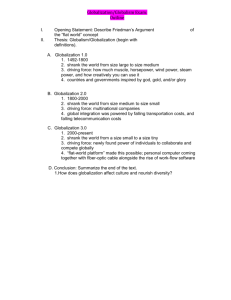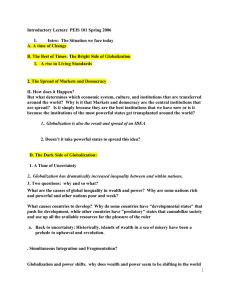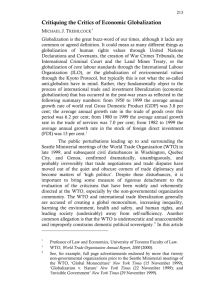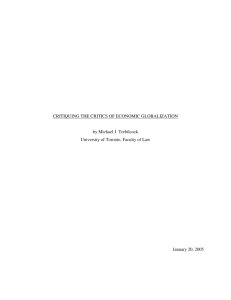The Invisible Hand: Failing on a Global Scale
advertisement
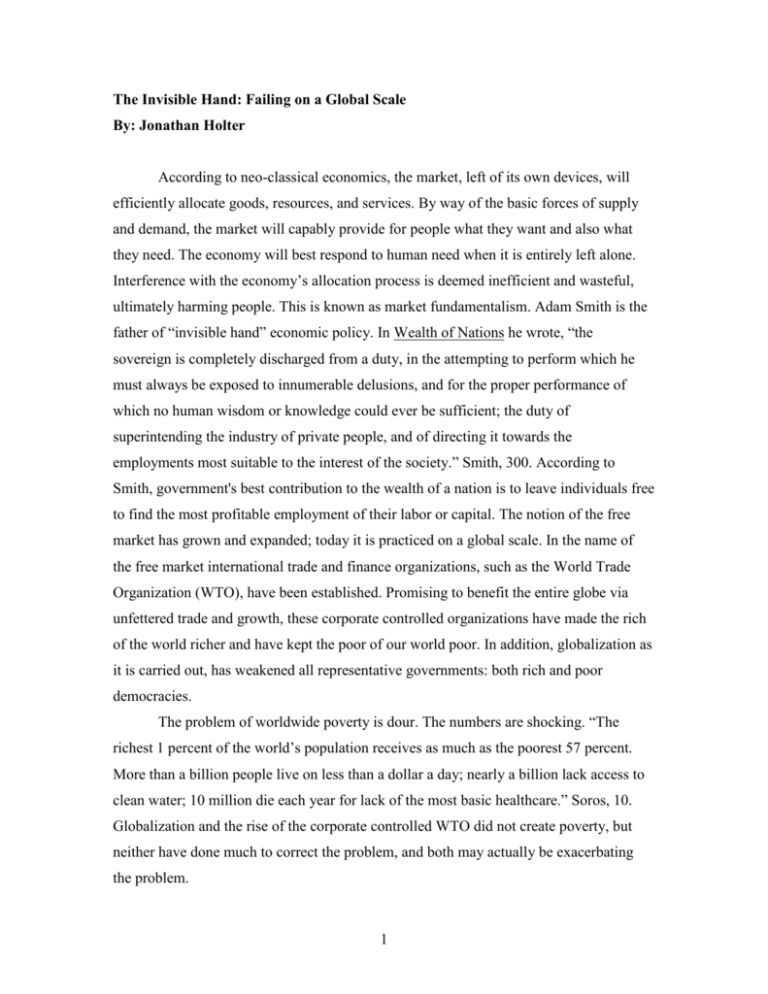
The Invisible Hand: Failing on a Global Scale By: Jonathan Holter According to neo-classical economics, the market, left of its own devices, will efficiently allocate goods, resources, and services. By way of the basic forces of supply and demand, the market will capably provide for people what they want and also what they need. The economy will best respond to human need when it is entirely left alone. Interference with the economy’s allocation process is deemed inefficient and wasteful, ultimately harming people. This is known as market fundamentalism. Adam Smith is the father of “invisible hand” economic policy. In Wealth of Nations he wrote, “the sovereign is completely discharged from a duty, in the attempting to perform which he must always be exposed to innumerable delusions, and for the proper performance of which no human wisdom or knowledge could ever be sufficient; the duty of superintending the industry of private people, and of directing it towards the employments most suitable to the interest of the society.” Smith, 300. According to Smith, government's best contribution to the wealth of a nation is to leave individuals free to find the most profitable employment of their labor or capital. The notion of the free market has grown and expanded; today it is practiced on a global scale. In the name of the free market international trade and finance organizations, such as the World Trade Organization (WTO), have been established. Promising to benefit the entire globe via unfettered trade and growth, these corporate controlled organizations have made the rich of the world richer and have kept the poor of our world poor. In addition, globalization as it is carried out, has weakened all representative governments: both rich and poor democracies. The problem of worldwide poverty is dour. The numbers are shocking. “The richest 1 percent of the world’s population receives as much as the poorest 57 percent. More than a billion people live on less than a dollar a day; nearly a billion lack access to clean water; 10 million die each year for lack of the most basic healthcare.” Soros, 10. Globalization and the rise of the corporate controlled WTO did not create poverty, but neither have done much to correct the problem, and both may actually be exacerbating the problem. 1 Since the expansion of “free trade” under the WTO the developing world is worse off. Free trade and the neo-classical economy have simply failed at meeting the social needs of a majority of the world. The 47 poorest countries have seen their export earnings drop between 2.6% and 5%. Accompanying this drop, the cost of food many of these countries are forced to import has risen. Wallach, 130. In Latin America, since the creation of the WTO, unskilled workers now earn 20-30% less. Id, 131. Africa’s terms of trade have worsened by 0.2%. African farmers have yet to see a boost in income, while traders have prospered. Id, 132. The dire numbers are the same in the East: parts of Asia have seen a 200% increase in absolute poverty and unemployment. Id, 135. Globalization has effectively taken from the poor and given to the rich, without setting up a safety net for those who miss its promised benefits. The supposed ultimate global free market, has produced wealth, but it has concentrated it among the world’s superpowers. The free market does not care about the misfortunes of the developing world, the bottom line is wealth creation and overall economic growth. The international finance and trade organizations have lofty goals of benefits for all, but their policies and practices truly benefit the already wealthy nations. Not surprisingly, the wealthy nations created and control these organizations. The much touted expansion of free trade, has actually become carefully managed and construed trade. The promises of globalization and expanded free trade were grand. Globalization supposedly offered individual freedom and economic liberty. Nations and their corruptible leaders were viewed to have a tendency to abuse their power. Free competition on a grand scale was to have liberated inventive and entrepreneurial talents and accelerated technological innovations. Wealth creation was to be more effective under private enterprise than under state control. Soros, 4. But globalization has proved to be an unregulated free-for-all solely benefiting the world’s rich and powerful. The rest of the world has been hurt by the effects of globalization. The developing world lacks the capacity to compete in a worldwide free market. Only very large corporations have the resources to enter and survive in foreign markets. WTO rules actively forbid countries from promoting local businesses because this can be seen as interfering with free trade by discriminating against foreign companies. Daly, 324. Small nations and their 2 correspondingly small economies are left to the whims of the economic agendas of the elite powers of the world. The creation of international trade organizations, such as the WTO, has weakened the power of the people in their local governments. By creating the WTO, governments have ceded their capacity to independently advance health and safety standards that protect citizens and have accepted harsh legal limitations on what domestic policies they may enact. Members of the WTO have institutionalized a global economic and political structure that makes every government increasingly hostage to a global financial and commerce system engineered through an autocratic system of international governance that favors corporate interests. Wallach, ix. In plain English, we have relinquished our autonomy to a bunch of trade bureaucrats at the WTO headquarters in Switzerland. The far-reaching power of the WTO has severely limited the measures local governments may take to ensure the health and safety of its citizens and their environment. The globalization of commerce and finance has been shaped by multi-national corporations that, in the absence of strong global rules, have simply conducted their business to suit their needs. This new system stresses the bottom line, profits for these multinationals and their shareholders, not the health and economic well-being of the people. Corporate interests view the world starkly; it is both a vast common market and a capital source. Governments, their “restrictive” laws, and the will of the people through democracy are factors that hamper corporate access to and exploitation of the global market and global capital. The WTO, in the name of “free trade,” and similar organizations, circumvents these obstacles to corporate profit. Herman Daly, in his farewell lecture to the World Bank expressed dismay over the effects of globalization. He stated that the push to eliminate the national control of commerce “is to wound fatally the major unit of community capable of carrying out any policies for the common good…Cosmopolitan globalism weakens national boundaries and the power of national and sub-national communities, while strengthening the relative power of transnational corporations.” Wallach, x. The rise of globalism is hindering the ability of people to take care of themselves. There are two possible solutions to the predicament brought on by globalization. We can strengthen international trade and finance organizations like the WTO, and 3 therefore make them better able to meet real needs of struggling nations and citizens. Alternatively, we can eliminate organizations like the WTO and focus on enabling local governments with the ability to meet the needs of their citizens. Strengthening international finance and trade organizations is a realistic option. First, correct the built in bias of such organizations that favors rich nations. Redistribution of the wealth created by globalization is necessary, and the rich nations will never voluntarily give up their wealth. By eliminating their stranglehold on these organizations, the developing nations of the world will be better represented. Next, empower these organizations with the means to deal with social problems. One of the fundamental flaws of modern economic globalization is the lack of an accompanying global scale social welfare system. The creation of powerful international institutions devoted to poverty reduction and provision of other public goods will make up for the omissions of the amoral, profit-driven free trade economy. The other solution is drastically different: eliminating the pervasive, all powerful international trade and finance organizations and focusing on the needs of local communities. According to this view, centralization of the economy is environmentally and democratically unsound. Smaller scale economic operations are more flexible and adaptable to local conditions. Locally owned and operated businesses are more likely to practice sustainable production methods. Local companies will have a stake in the health of the community, its environment, and its people. Finally, a localized economy is more susceptible to democratic controls, and therefore, more responsive to local needs. Globalization and the rise of the unfettered free trade economy have changed the world for the worse. The grand idea of a worldwide laissez faire economy, as implemented, has eroded local democracies and impoverished most. Social needs have been entirely left out of the equation. A change in the operation of the global free trade is needed. 4 References Adam Smith, An Inquiry Into the Nature and Causes of the Wealth of Nations, Encyclopedia Britannica, Inc, 1952. George Soros, On Globalization, Public Affairs, 2002. Herman E. Daly and Joshua Farley, Ecological Economics: Principles and Applications, Island Press, 2003. Lori Wallach and Michelle Sforza, Whose Trade Organization? Corporate Globalization and the Erosion of Democracy, Public Citizen, 1999. 5




